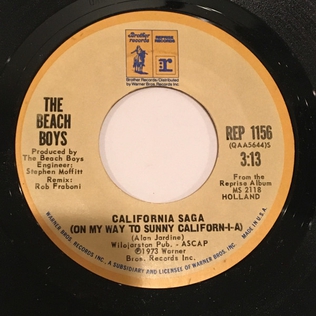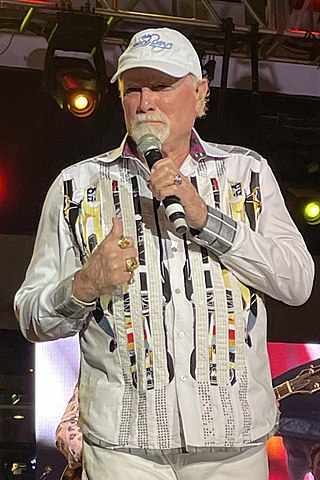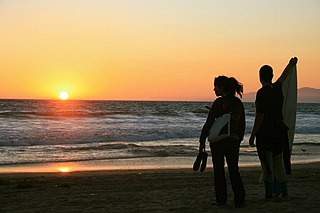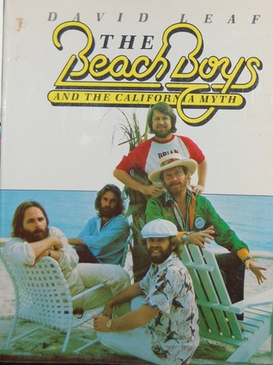Other uses
- The Beach Boys, a 2024 documentary of the band directed by Frank Marshall and Thom Zimny
The Beach Boys are an American rock group formed in California in 1961.
(The) Beach Boy(s) may also refer to:

The Beach Boys are an American rock band formed in Hawthorne, California, in 1961. The group's original lineup consisted of brothers Brian, Dennis, and Carl Wilson, their cousin Mike Love, and friend Al Jardine. Distinguished by their vocal harmonies, adolescent-oriented lyrics, and musical ingenuity, they are one of the most influential acts of the rock era. They drew on the music of older pop vocal groups, 1950s rock and roll, and black R&B to create their unique sound. Under Brian's direction, they often incorporated classical or jazz elements and unconventional recording techniques in innovative ways.

Bruce Arthur Johnston is an American singer, musician, and songwriter who is a member of the Beach Boys. He also collaborated on many records with Terry Melcher and composed the 1975 Barry Manilow hit, "I Write the Songs".

Dennis Carl Wilson was an American musician who co-founded the Beach Boys. He is best remembered as their drummer and as the middle brother of bandmates Brian and Carl Wilson. Dennis was the only true surfer in the Beach Boys, and his personal life exemplified the "California Myth" that the band's early songs often celebrated. He was also known for his association with the Manson Family and for co-starring in the 1971 film Two-Lane Blacktop.

Carl Dean Wilson was an American musician who co-founded the Beach Boys. He was their lead guitarist, the youngest sibling of bandmates Brian and Dennis, and the group's de facto leader in the early to mid-1970s. He was also the band's musical director on stage from 1965 until his death.
"California Girls" is a song by the American rock band the Beach Boys from their 1965 album Summer Days . Written by Brian Wilson and Mike Love, the lyrics were partly inspired by the band's experiences touring Europe for the first time, detailing an appreciation for women across the world. It was released as a single, backed with "Let Him Run Wild", and reached number 3 on the Billboard Hot 100. It was also a top 10 hit in several other countries, becoming one of the band's most successful songs globally.

Alan Charles Jardine is an American musician who co-founded the Beach Boys. He is best known as the band's rhythm guitarist, background vocalist, and for occasionally singing lead vocals on singles such as "Help Me, Rhonda" (1965), "Then I Kissed Her" (1965), "Cottonfields" (1970), and a cover of the Del-Vikings’ "Come Go with Me" (1981). His song "Lady Lynda" was also a UK top 10 hit for the group in 1978. Other Beach Boys songs that feature Jardine on lead include "I Know There's an Answer" (1966), “Vegetables" (1967), a cover of Buddy Holly’s “Peggy Sue” (1978), and "From There to Back Again" (2012).

The Beach Boys Love You is the 21st studio album by American rock band the Beach Boys, released April 11, 1977, on Brother/Reprise. Sometimes called the band's "punk" or "synth-pop" album, Love You is characterized for its pioneering use of synthesizers and its juxtaposition of adolescent-oriented lyrics with the adult band members' gravelly vocals.

Timothy Bruce Schmit is an American musician, singer, and songwriter. He has performed as the bassist and vocalist for Poco and the Eagles, having replaced Randy Meisner in both cases. Schmit has also worked for decades as a session musician and solo artist. In 1998, he was inducted into the Rock and Roll Hall of Fame as a member of the Eagles.

All Summer Long is the sixth album by the American rock band the Beach Boys, released July 13, 1964 on Capitol Records. Regarded as their first artistically unified collection of songs, as well as one of the first true concept albums, it marked the Beach Boys' first LP that was not focused on themes of cars or surfing. Instead, the songs are semi-autobiographical and relate to the experiences of a typical Southern Californian teenager, a theme encapsulated by the title track, "All Summer Long", and the often-imitated front cover, a modernist style photo collage depicting the band members fraternizing with young women on a beach.

The Honeys were an American girl group, formed in Los Angeles in 1958, that initially comprised sisters Marilyn, Diane, and Barbara Rovell. Barbara was later replaced by their cousin, Ginger Blake. After 1962, the Rovell Sisters were rechristened "the Honeys" by the Beach Boys' Brian Wilson, who envisioned the group as a female counterpart to his band. Wilson served as the Honeys' record producer and chief songwriter, and later married Marilyn in late 1964.

"Be True to Your School" is a song by American rock band the Beach Boys from their 1963 album Little Deuce Coupe. Written by Brian Wilson and Mike Love, it was issued as a single on October 28, 1963. There are two versions of this song: the album version, and the single version, which added cheerleader yells by the girl group The Honeys in between verses. The song features the melody of the University of Wisconsin's fight song, "On, Wisconsin!", although it is a tribute to Hawthorne High School, which the Wilson brothers attended. Hawthorne High School's fight song uses the same melody as "On, Wisconsin!".

"California Saga/California" is a song by American rock band the Beach Boys from their January 1973 album Holland. It was written by Al Jardine and is the third and final part of the "California Saga" series of songs on Holland. In May 1973, a remixed version was issued as a single under the title "California Saga ".

Michael Edward Love is an American singer and songwriter who was the lead vocalist of the Beach Boys which he co-founded with his cousins Brian, Dennis, and Carl Wilson and their friend Al Jardine. Characterized by his nasal tenor and occasional bass-baritone singing, Love has been one of the band's vocalists and lyricists for their entire career, contributing to each of their studio albums and serving as their frontman for live performances. During the mid-1960s, he was one of Brian's main collaborators, contributing lyrics to hit records such as "Fun, Fun, Fun" (1964), "I Get Around" (1964), "Help Me, Rhonda" (1965), "California Girls" (1965), and "Good Vibrations" (1966).

Adrian Baker is an English singer, songwriter, and record producer.
Jon Stebbins is a Los Osos, California-based musician, songwriter, documentary producer and author of four books about The Beach Boys, as well as two other books.

The 50th Anniversary Reunion Tour was a 2012 world concert tour by the American rock band the Beach Boys. The tour marked the first time since 1982 that founding member Brian Wilson had consistently performed on a full tour with the band. The tour also marked the first time that the Beach Boys had played at the Hollywood Bowl since 1967, having sold it out both times.

That's Why God Made the Radio is the twenty-ninth and the most recent studio album by American rock band the Beach Boys, released on June 5, 2012, on Capitol Records. Produced by Brian Wilson, the album was recorded to coincide with the band's 50th anniversary. It is their first studio album since 1996's Stars and Stripes Vol. 1, the first album to feature original material since Summer in Paradise in 1992, their first album to feature guitarist and backing vocalist David Marks since Little Deuce Coupe in 1963, and their first album since the 1998 death of co-founder Carl Wilson.

The California sound is a popular music aesthetic that originates with American pop and rock recording artists from Southern California in the early 1960s. At first, it was conflated with the California myth, an idyllic setting inspired by the state's beach culture that commonly appeared in the lyrics of commercial pop songs. Later, the sound was expanded outside its initial geography and subject matter and was developed to be more sophisticated, often featuring studio experimentation.
"Surfin' U.S.A." is a song by the American rock band the Beach Boys, credited to Chuck Berry and Brian Wilson. It is a rewritten version of Berry's "Sweet Little Sixteen" set to new lyrics written by Wilson and an uncredited Mike Love. The song was released as a single on March 4, 1963, backed with "Shut Down". It was then placed as the opening track on their album of the same name.

The Beach Boys and the California Myth is a 1978 biography of the Beach Boys that was written by American author David Leaf, editor and creator of the Pet Sounds fanzine. It was the first full-length book written about the band and an early piece of writing that revealed much of their internal conflicts and family history.